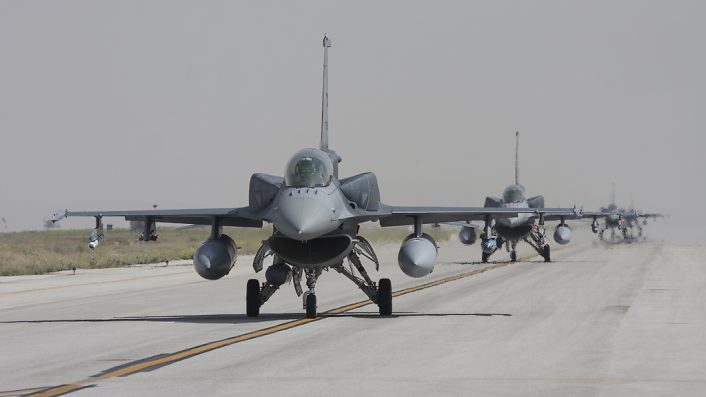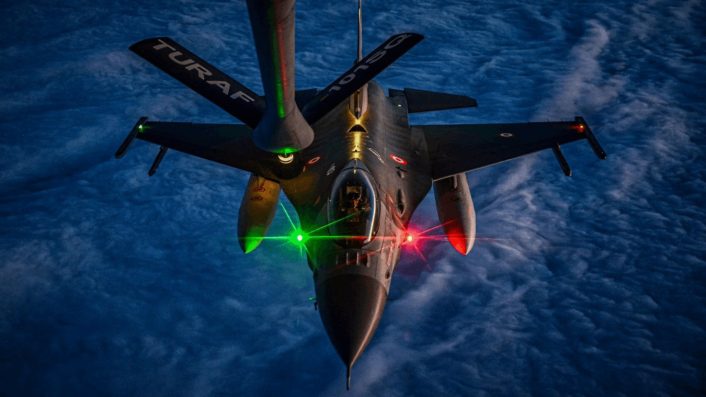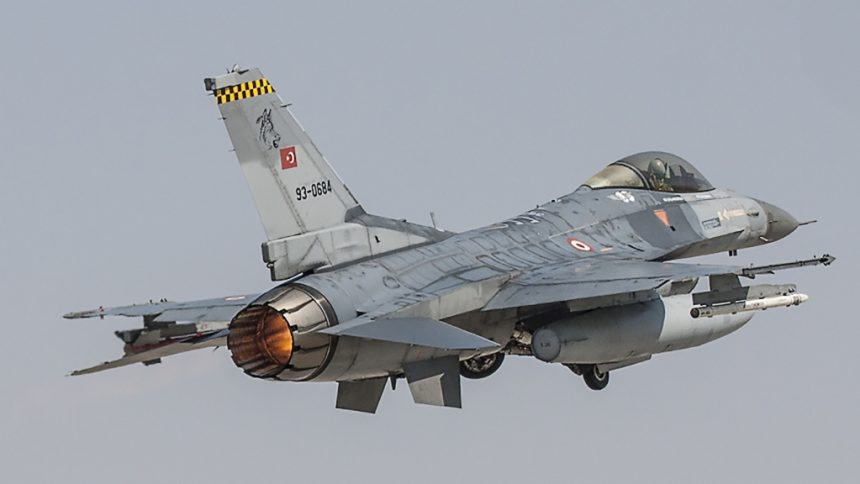In early 2023, Turkey announced the modernization of 35 F-16 Block 30 jets with domestically-developed software, avionics and electronics.
Turkey is cutting back on its $23 billion contract with the US to modernize its fleet of F-16 to the Block 70 standard using kits from Lockheed Martin, and rather considering producing some parts domestically. Unidentified officials quoted by Bloomberg said the high price, budget constraints and the growing capability of Turkey’s advancing defense aerospace sector are some of the motivations.
Ankara has NATO’s second largest fleet of F-16 jets. According to Reuters, it operates a little over 200 F-16 Block 30/40/50 variants. The US sent draft letters of offer and acceptance for Turkey’s request to buy 40 Block-70 F-16 fighter jets, modernization kits and ammunition on Feb. 29, 2024.

The US approved the sale to Turkey after its government ratified Sweden’s membership in NATO. However, Turkey “is now pushing to buy fewer upgrade kits and munitions to save billions of dollars amid spending cuts at home,” Bloomberg said, quoting officials in deep background. They said Turkey’s developing military aviation industry can “handle some of its needs.” Turkish reports described these as offset deals that Turkey seeks from the US, which would entail local production of some of the F-16 parts.
Turkish Air Force is scheduled to deploy their F-16 Fighter Jets and approx. 80 personnel from 6th Air Base at Bandirma, Turkey, to Poland’s Malbork Air Base.
Turkey will support NATO’s Baltic Air Policing.#NATO #WeAreNATO pic.twitter.com/L0mmBygrOu
— Tugay Er (@er_tugay_) May 24, 2021
Turkish industry’s experience
The country was a partner nation in the F-35 program before it was expelled in 2020 under the CAATSA (Countering America’s Adversaries Through Sanctions Act), following its acquisition of the Russian S-400 AD system. Turkey was building about 900 parts for the stealth fighter and had made an advance payment of $1.4 billion for around 100 units of the jet.
“The US suspended 10 Turkish companies which were on track to make about $12 billion in F-35 parts, including the center fuselage produced by Turkish Aerospace Industries,” Bloomberg added. Turkey has since then been trying to get the sanctions lifted in return for arriving at a compromise over the S-400.
On Jul. 13, 2024, on his way back from Washington DC at the NATO summit, President Recep Tayyip Erdogan made an ambivalent statement that did not appear to cancel the F-16 deal with the US. Yet at the same time, he upheld the Turkish defense industry’s capability to undertake modernization. “Our priority is to fulfill Turkey’s F-16 request. There may be different situations in subordinate matters, but we do not want to put monetary relations on our agenda. If these aircraft and parts come to us, we already have sufficient technical staff. All of our labs are very successful in modernizing the F-16s,” he said.
Turdef said that Turkey has the Turkish Aerospace (TUSAŞ) facility to produce F-16 Vipers “under license.” Turkey also has two MRO (Maintenance, Repair, and Overhaul) facilities in Ankara and the Defence Ministry’s 1st Air Maintenance Factory Directorate in Eskişehir. Both can undertake MLU (Mid-Life Upgrades) and other modernisation works. TAI has already produced F-16 for Egypt and conducted modernisation programmes for Pakistan and Jordan.

The report did go on to add that the “negotiations are ongoing even though the formal process is completed.” However, if Turkey’s request “exceeds the $23 billion package, an amendment request must follow the approval process.” The framing suggests the new deal, if the US agrees, will entail again going before the US lawmakers for approval.
Previous indigenous upgrade
Turdef went on to refer to the Özgür Project that Turkey undertook to “modernize its existing fleet with local content.” In fact, in early 2023, Turkey announced beginning work on 35 F-16 Block 30 jets with TAI (Turkish Aerospace Industries) to upgrade the jets with a host of new software, avionics and electronics.
This include a national mission computer, system interface units, cockpit upper front control panels, fuel hydraulic indicators, engine display screens, emergency indicators, national sound safety devices, national IFF (Identification Friend-Foe) system, multi-mode receivers, inertial navigation systems, interface blinding units, helmet integrated aiming systems, center cockpit indicator and color multifunction displays.
The Özgür-upgraded F-16s would also receive the MURAD AESA (Active Electronically Array) developed by defense major Aselsan. MURAD has been assessed to be installed on the Kizilelma UCAV and has been planned to be fitted on to the KAAN fighter and the ANKA-3 UCAV as well.
NATO Geliştirilmiş Hava Polisliği görevi için bugün Romanya’da Türk ve Romanya F-16’ları önleme uçuşu icra etti.
Yazarımız @DogutCem bu uçuşu yerinden takip etti.
⭕️ Bugünkü senaryoda iletişimi kesilen, kimliği bilinmeyen uçak rolünde Romanya Hava kuvvetleri bağlısı C-27J… pic.twitter.com/1JkCjYtUZQ
— Defence Turkey Magazine (@DefenceTurkey) March 6, 2024
Assuming the Bloomberg report is correct and the Turkish offer is accepted, “the Turkish Air Force would have more F-16s under the Özgür Project as the modernisation programme would be transferred to TUSAŞ and ASELSAN.”
Eyeing Eurofighter Typhoon too
It must also be noted that Turkey has long been trying to court Germany and the UK for the Eurofighter Typhoon, to match Greece’s acquisition of nearly two dozen Dassault Rafales from France. Eighty-three F-16s in the (HAF) Hellenic Air Force are undergoing upgrades to the Block 72 standard, while Athens was also granted the sale of 40 F-35s from the US.
While Germany has long resisted the Turkish advances owing to a host of diplomatic and geopolitical reasons, London has indicated willingness to work with Ankara on the issue. It was revealed in Nov. 2023 that, beside the UK, Turkey was also in talks with Spain for procuring 40 Eurofighters.
Defense Minister Guler has reportedly stated the Turkish Eurofighter bid is a response to the Greek Rafale acquisition. In comments to Greek media, Guler said Greek Rafales have given Athens “air superiority in the airspace of the Aegean.” “Thus, it is considered that Turkey, to respond to the Greek Rafale, is making this move and is attempting to buy the European Eurofighters,” he said.









